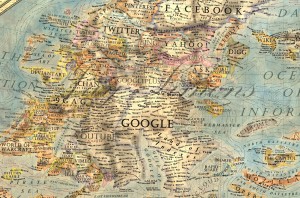Today’s forum discussed print and network literacies. Often I’m left reflecting on the similarities between things rather than searching for clear-cut distinctions, particularly so concerning the commonality between technologies. Literacy – be it print or network – gives us the means to connect in inherently social ways (ideas, narratives, discussion, etc.) Of course social connection may be the product or byproduct of any given literacy; for example, mechanical (auto) literacy allows us to understand and engage in the workings of our car and not get duped by a dishonest mechanic, but this in itself is inherently social.
I’m also left contemplating on form versus content in various guises, which was certainly something which resonated in last week’s reading, where the ability to apprehend form and learn from it (e.g. how we learn) was explained as double-loop learning by Chris Argyris & Donald Schön.
Form influences content and content can lead to new form (e.g. imagining up a new piece of technology – which can be put into effect), so clearly the relationship is dynamic. Specifically, I was considering how the form of digital technology (i.e. the internet) and network literacy has influenced our perception of print.
For example, internet and the ease of self-publishing online has seen the precipitous rise of citizen journalism – which brings with it the good, the bad, the bigoted, the uninformed, the weird, etc, etc, etc. With that, we have come to realise the need to scrutinize the veracity and validity of the information we receive online, which was a focal point in today’s symposium. Concurrently, we’ve seen the rise of alternative media and political websites and blogs (e.g. Huffington Post, Counter Punch, Dissident Voice, amongst many others) which draw us to the potential bias of corporate mainstream media.
As a result, I believe (I don’t have the empirical evidence to back it up right now… but watch this space!) that the public are generally more aware of the potential fallibility of mainstream newspaper reporting (even those considered more esteemed – the New York Times, and the recent flack the BBC has encountered over its coverage of the recent conflict in Gaza…)
Whenever a new technology is introduced, it seems to bring with it equal parts awe, excitement and suspicion, until it becomes part of normal, everyday life and culture. For centuries, print was the dominant (only) literary form and print – the newspaper – was arguably deified as a source of veritable truth and expert opinion. Certainly I think it’s still highly valid and highly respected by many, yet with a competitive or at least alternative news form on the scene – the internet – print has lost some of its prestige and mantle as the veritable mecca for quality news distribution and commentary… something about the decentralisation of things in our (sorry to use the word…) postmodern era?
References:
Chris Argyris: Theories of Action, Double-Loop Learning and Organizational Learning.” http://infed.org/mobi/chris-argyris-theories-of-action-double-loop-learning-and-organizational-learning/. N.p., n.d. Web. 18 July 2013.

